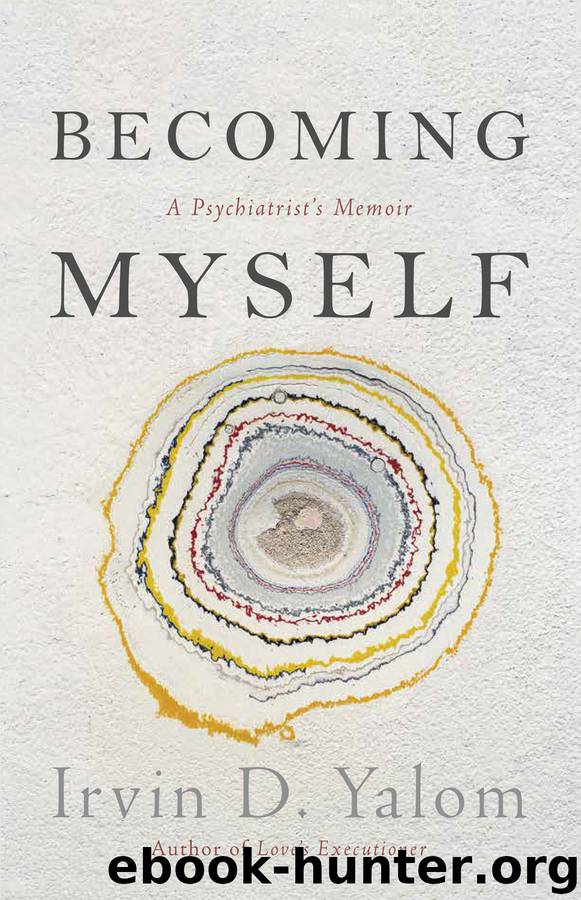Becoming Myself by Irvin D. Yalom

Author:Irvin D. Yalom
Language: eng
Format: epub, mobi
Publisher: Basic Books
Published: 2017-10-03T04:00:00+00:00
CHAPTER TWENTY-THREE
EXISTENTIAL THERAPY
Ever since reading Rollo May’s Existence early in my psychiatric residency and taking my first philosophy courses at Hopkins, I had been wondering how I could begin to incorporate the wisdom of the past into my field of psychotherapy. The more philosophy I read, the more I realized how many profound ideas psychiatry had ignored. I much regretted that I had only a rickety foundation in philosophy and the humanities in general, and was determined to begin to address these gaps in my education.
I started auditing a number of Stanford undergraduate courses in phenomenology and existentialism, many of them taught by a remarkably lucid thinker and lecturer, Professor Dagfinn Føllesdal. I found the material fascinating, if dense and difficult, and struggled particularly with Edmund Husserl and Martin Heidegger. I found Heidegger’s Being and Time opaque, but also intriguing, so much so that I sat through Dagfinn’s Heidegger course twice. He and I were to develop a lifelong friendship. The other Stanford professor teaching courses in my area of interest was Van Harvey, who, despite his staunch agnosticism, was the long-term chair of the Stanford Department of Religious Studies. Sitting in the front row of his classroom, I listened, mesmerized, to his lectures on Kierkegaard and Nietzsche, two of the most unforgettable courses I’ve ever taken. Van Harvey, too, became a close friend, and to this day we meet for regular luncheons to talk about philosophy.
My whole professional life was changing: less and less did I seek collaboration with scientific projects conducted by members of my department. When psychology professor David Rosenhan went on sabbatical, I stepped in to teach his large undergraduate course on abnormal psychology, but that would be my finale—the last such course I taught.
I gradually drifted away from my original affiliation with medical science and began grounding myself in the humanities. This was an exciting time, but also a time of self-doubt: I often felt like an outsider, losing touch with new developments in psychiatry and, at the same time, becoming just a dabbler in philosophy and literature. Gradually I would pick and choose among thinkers who seemed most relevant to my field. I embraced Nietzsche, Sartre, Camus, Schopenhauer, and Epicurus/Lucretius, and bypassed Kant, Leibniz, Husserl, and Kierkegaard because the clinical application of their ideas was less apparent to me.
I also had the good fortune of attending classes given by English professor Albert Guerard, a remarkable literary critic and novelist, and then the honor of co-teaching with him. He and his wife, Maclin—also a writer—became dear friends. In the early 1970s Professor Guerard started a new PhD program in Modern Thought and Literature, and Marilyn and I both served on his board. I began teaching more in the humanities and less in the medical school. Some of the earliest offerings in Modern Thought and Literature included “Psychiatry and Biography,” which I co-taught with Tom Moser, the chair of the Stanford English Department, who also became a good friend. Marilyn and I co-taught “Death in Fiction,” and I also co-taught “Philosophy and Psychiatry” with Dagfinn Føllesdal.
Download
This site does not store any files on its server. We only index and link to content provided by other sites. Please contact the content providers to delete copyright contents if any and email us, we'll remove relevant links or contents immediately.
| Administration & Medicine Economics | Allied Health Professions |
| Basic Sciences | Dentistry |
| History | Medical Informatics |
| Medicine | Nursing |
| Pharmacology | Psychology |
| Research | Veterinary Medicine |
The Art of Thinking Clearly by Rolf Dobelli(8835)
The 5 Love Languages: The Secret to Love That Lasts by Gary Chapman(8480)
Mindhunter: Inside the FBI's Elite Serial Crime Unit by John E. Douglas & Mark Olshaker(7827)
Becoming Supernatural by Dr. Joe Dispenza(7098)
Nudge - Improving Decisions about Health, Wealth, and Happiness by Thaler Sunstein(6629)
The Road Less Traveled by M. Scott Peck(6626)
Enlightenment Now: The Case for Reason, Science, Humanism, and Progress by Steven Pinker(6402)
Win Bigly by Scott Adams(6306)
Mastermind: How to Think Like Sherlock Holmes by Maria Konnikova(6220)
The Way of Zen by Alan W. Watts(5786)
Factfulness: Ten Reasons We're Wrong About the World – and Why Things Are Better Than You Think by Hans Rosling(4011)
The State of Affairs by Esther Perel(3917)
Gerald's Game by Stephen King(3913)
Man's Search for Meaning by Viktor Frankl(3620)
The Confidence Code by Katty Kay(3560)
Thinking in Bets by Annie Duke(3526)
The Worm at the Core by Sheldon Solomon(2910)
Enlightenment Now by Steven Pinker(2910)
Liar's Poker by Michael Lewis(2804)
